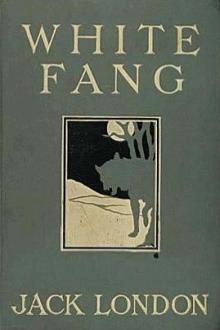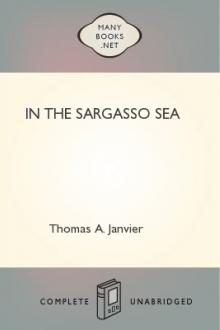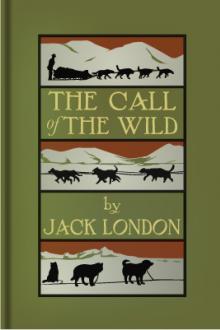Brown Wolf and Other Jack London Stories by Jack London (chromebook ebook reader txt) 📕

- Author: Jack London
Book online «Brown Wolf and Other Jack London Stories by Jack London (chromebook ebook reader txt) 📕». Author Jack London
one jump ahead of them. The American was swept away and over the stern like a piece of chaff. Ah Choon caught a spoke of the wheel, and swung in behind it. But a strapping Raratonga vahine (woman)--she must have weighed two hundred and fifty--brought up against him, and got an arm around his neck. He clutched the kanaka steersman with his other hand; and just at that moment the schooner flung down to starboard.
The rush of bodies and sea that was coming along the port runway between the cabin and the rail turned abruptly and poured to starboard. Away they went--vahine, Ah Choon, and steersman: and I swear I saw Ah Choon grin at me with philosophic resignation as he cleared the rail and went under.
The third sea--the biggest of the three--did not do so much damage. By the time it arrived nearly everybody was in the rigging. On deck perhaps a dozen gasping, half-drowned, and half-stunned wretches were rolling about or attempting to crawl into safety. They went by the board, as did the wreckage of the two remaining boats. The other pearl-buyers and myself, between seas, managed to get about fifteen women and children into the cabin, and battened down. Little good it did the poor creatures in the end.
Wind? Out of all my experience I could not have believed it possible for the wind to blow as it did. There is no describing it. How can one describe a nightmare? It was the same way with that wind. It tore the clothes off our bodies. I say tore them off , and I mean it. I am not asking you to believe it. I am merely telling something that I saw and felt. There are times when I do not believe it myself. I went through it, and that is enough. One could not face that wind and live. It was a monstrous thing, and the most monstrous thing about it was that it increased and continued to increase.
Imagine countless millions and billions of tons of sand. Imagine this sand tearing along at ninety, a hundred, a hundred and twenty, or any other number of miles per hour. Imagine, further, this sand to be invisible, impalpable, yet to retain all the weight and density of sand. Do all this, and you may get a vague inkling of what that wind was like.
Perhaps sand is not the right comparison. Consider it mud, invisible, impalpable, but heavy as mud. Nay, it goes beyond that. Consider every molecule of air to be a mud-bank in itself. Then try to imagine the multitudinous impact of mud-banks. No; it is beyond me. Language may be adequate to express the ordinary conditions of life, but it cannot possibly express any of the conditions of so enormous a blast of wind. It would have been better had I stuck by my original intention of not attempting a description.
I will say this much: The sea, which had risen at first, was beaten down by that wind. More: it seemed as if the whole ocean had been sucked up in the maw of the hurricane, and hurled on through that portion of space which previously had been occupied by the air.
Of course, our canvas had gone long before. But Captain Oudouse had on the Petite Jeanne something I had never before seen on a South Sea schooner--a sea-anchor. It was a conical canvas bag, the mouth of which was kept open by a huge hoop of iron. The sea-anchor was bridled something like a kite, so that it bit into the water as a kite bites into the air, but with a difference. The sea-anchor remained just under the surface of the ocean in a perpendicular position. A long line, in turn, connected it with the schooner. As a result, the Petite Jeanne rode bow on to the wind and to what sea there was.
The situation really would have been favorable had we not been in the path of the storm. True, the wind itself tore our canvas out of the gaskets, jerked out our topmasts, and made a raffle of our running-gear, but still we would have come through nicely had we not been square in front of the advancing storm-centre. That was what fixed us. I was in a state of stunned, numbed, paralyzed collapse from enduring the impact of the wind, and I think I was just about ready to give up and die when the centre smote us. The blow we received was an absolute lull. There was not a breath of air. The effect on one was sickening.
Remember that for hours we had been at terrific muscular tension, withstanding the awful pressure of that wind. And then, suddenly, the pressure was removed. I know that I felt as though I was about to expand, to fly apart in all directions. It seemed as if every atom composing my body was repelling every other atom and was on the verge of rushing off irresistibly into space. But that lasted only for a moment. Destruction was upon us.
In the absence of the wind and pressure the sea rose. It jumped, it leaped, it soared straight toward the clouds. Remember, from every point of the compass that inconceivable wind was blowing in toward the centre of calm. The result was that the seas sprang up from every point of the compass. There was no wind to check them. They popped up like corks released from the bottom of a pail of water. There was no system to them, no stability. They were hollow, maniacal seas. They were eighty feet high at the least. They were not seas at all. They resembled no sea a man had ever seen.
They were splashes, monstrous splashes--that is all. Splashes that were eighty feet high. Eighty! They were more than eighty. They went over our mastheads. They were spouts, explosions. They were drunken. They fell anywhere, anyhow. They jostled one another; they collided. They rushed together and collapsed upon one another, or fell apart like a thousand waterfalls all at once. It was no ocean any man had ever dreamed of, that hurricane centre. It was confusion thrice confounded. It was anarchy. It was a hell-pit of sea-water gone mad.
The Petite Jeanne ? I don't know. The heathen told me afterward that he did not know. She was literally torn apart, ripped wide open, beaten into a pulp, smashed into kindling wood, annihilated. When I came to I was in the water, swimming automatically, though I was about two-thirds drowned. How I got there I had no recollection. I remembered seeing the
Petite Jeanne fly to pieces at what must have been the instant that my own consciousness was buffetted out of me. But there I was, with nothing to do but make the best of it, and in that best there was little promise. The wind was blowing again, the sea was much smaller and more regular, and I knew that I had passed through the centre. Fortunately, there were no sharks about. The hurricane had dissipated the ravenous horde that had surrounded the death ship and fed off the dead.
It was about midday when the Petite Jeanne went to pieces, and it must have been two hours afterward when I picked up with one of her hatch-covers. Thick rain was driving at the time; and it was the merest chance that flung me and the hatch-cover together. A short length of line was trailing from the rope handle; and I knew that I was good for a day, at least, if the sharks did not return. Three hours later, possibly a little longer, sticking close to the cover, and, with closed eyes, concentrating my whole soul upon the task of breathing in enough air to keep me going and at the same time of avoiding breathing in enough water to drown me, it seemed to me that I heard voices. The rain had ceased, and wind and sea were easing marvellously. Not twenty feet away from me on another hatch-cover, were Captain Oudouse and the heathen. They were fighting over the possession of the cover--at least, the Frenchman was.
" Paien noir !" I heard him scream, and at the same time I saw him kick the kanaka.
Now, Captain Oudouse had lost all his clothes, except his shoes, and they were heavy brogans. It was a cruel blow, for it caught the heathen on the mouth and the point of the chin, half stunning him. I looked for him to retaliate, but he contented himself with swimming about forlornly a safe ten feet away. Whenever a fling of the sea threw him closer, the Frenchman, hanging on with his hands, kicked out at him with both feet. Also, at the moment of delivering each kick, he called the kanaka a black heathen.
"For two centimes I'd come over there and drown you, you white beast!" I yelled.
The only reason I did not go was that I felt too tired. The very thought of the effort to swim over was nauseating. So I called to the kanaka to come to me, and proceeded to share the hatch-cover with him. Otoo, he told me his name was (pronounced o-to-o); also, he told me that he was a native of Bora Bora, the most westerly of the Society Group. As I learned afterward, he had got the hatch-cover first, and, after some time, encountering Captain Oudouse, had offered to share it with him, and had been kicked off for his pains.
And that was how Otoo and I first came together. He was no fighter. He was all sweetness and gentleness, a love-creature, though he stood nearly six feet tall and was muscled like a gladiator. He was no fighter, but he was also no coward. He had the heart of a lion; and in the years that followed I have seen him run risks that I would never dream of taking. What I mean is that while he was no fighter, and while he always avoided precipitating a row, he never ran away from trouble when it started. And it was "'Ware shoal!" when once Otoo went into action. I shall never forget what he did to Bill King. It occurred in German Samoa. Bill King was hailed the champion heavyweight of the American Navy. He was a big brute of a man, a veritable gorilla, one of those hard-hitting, rough-housing chaps, and clever with his fists as well. He picked the quarrel, and he kicked Otoo twice and struck him once before Otoo felt it to be necessary to fight. I don't think it lasted four minutes, at the end of which time Bill King was the unhappy possessor of four broken ribs, a broken forearm, and a dislocated shoulder-blade. Otoo knew nothing of scientific boxing. He was merely a manhandler; and Bill King was something like three months in recovering from the bit of manhandling he received that afternoon on Apia beach.
But I am running ahead of my yarn. We shared the hatch-cover between us. We took turn and turn about, one lying flat on the cover and resting, while the other, submerged to the neck, merely held on with his hands. For two days and nights, spell and spell, on the cover and in the water, we drifted over the ocean. Toward the last I was delirious most of the time; and there were times, too, when I heard Otoo babbling and raving in his native tongue. Our continuous immersion prevented us from dying of thirst, though the sea-water and the sunshine gave us the prettiest imaginable combination of salt pickle and sunburn.
In the end, Otoo saved my life;
The rush of bodies and sea that was coming along the port runway between the cabin and the rail turned abruptly and poured to starboard. Away they went--vahine, Ah Choon, and steersman: and I swear I saw Ah Choon grin at me with philosophic resignation as he cleared the rail and went under.
The third sea--the biggest of the three--did not do so much damage. By the time it arrived nearly everybody was in the rigging. On deck perhaps a dozen gasping, half-drowned, and half-stunned wretches were rolling about or attempting to crawl into safety. They went by the board, as did the wreckage of the two remaining boats. The other pearl-buyers and myself, between seas, managed to get about fifteen women and children into the cabin, and battened down. Little good it did the poor creatures in the end.
Wind? Out of all my experience I could not have believed it possible for the wind to blow as it did. There is no describing it. How can one describe a nightmare? It was the same way with that wind. It tore the clothes off our bodies. I say tore them off , and I mean it. I am not asking you to believe it. I am merely telling something that I saw and felt. There are times when I do not believe it myself. I went through it, and that is enough. One could not face that wind and live. It was a monstrous thing, and the most monstrous thing about it was that it increased and continued to increase.
Imagine countless millions and billions of tons of sand. Imagine this sand tearing along at ninety, a hundred, a hundred and twenty, or any other number of miles per hour. Imagine, further, this sand to be invisible, impalpable, yet to retain all the weight and density of sand. Do all this, and you may get a vague inkling of what that wind was like.
Perhaps sand is not the right comparison. Consider it mud, invisible, impalpable, but heavy as mud. Nay, it goes beyond that. Consider every molecule of air to be a mud-bank in itself. Then try to imagine the multitudinous impact of mud-banks. No; it is beyond me. Language may be adequate to express the ordinary conditions of life, but it cannot possibly express any of the conditions of so enormous a blast of wind. It would have been better had I stuck by my original intention of not attempting a description.
I will say this much: The sea, which had risen at first, was beaten down by that wind. More: it seemed as if the whole ocean had been sucked up in the maw of the hurricane, and hurled on through that portion of space which previously had been occupied by the air.
Of course, our canvas had gone long before. But Captain Oudouse had on the Petite Jeanne something I had never before seen on a South Sea schooner--a sea-anchor. It was a conical canvas bag, the mouth of which was kept open by a huge hoop of iron. The sea-anchor was bridled something like a kite, so that it bit into the water as a kite bites into the air, but with a difference. The sea-anchor remained just under the surface of the ocean in a perpendicular position. A long line, in turn, connected it with the schooner. As a result, the Petite Jeanne rode bow on to the wind and to what sea there was.
The situation really would have been favorable had we not been in the path of the storm. True, the wind itself tore our canvas out of the gaskets, jerked out our topmasts, and made a raffle of our running-gear, but still we would have come through nicely had we not been square in front of the advancing storm-centre. That was what fixed us. I was in a state of stunned, numbed, paralyzed collapse from enduring the impact of the wind, and I think I was just about ready to give up and die when the centre smote us. The blow we received was an absolute lull. There was not a breath of air. The effect on one was sickening.
Remember that for hours we had been at terrific muscular tension, withstanding the awful pressure of that wind. And then, suddenly, the pressure was removed. I know that I felt as though I was about to expand, to fly apart in all directions. It seemed as if every atom composing my body was repelling every other atom and was on the verge of rushing off irresistibly into space. But that lasted only for a moment. Destruction was upon us.
In the absence of the wind and pressure the sea rose. It jumped, it leaped, it soared straight toward the clouds. Remember, from every point of the compass that inconceivable wind was blowing in toward the centre of calm. The result was that the seas sprang up from every point of the compass. There was no wind to check them. They popped up like corks released from the bottom of a pail of water. There was no system to them, no stability. They were hollow, maniacal seas. They were eighty feet high at the least. They were not seas at all. They resembled no sea a man had ever seen.
They were splashes, monstrous splashes--that is all. Splashes that were eighty feet high. Eighty! They were more than eighty. They went over our mastheads. They were spouts, explosions. They were drunken. They fell anywhere, anyhow. They jostled one another; they collided. They rushed together and collapsed upon one another, or fell apart like a thousand waterfalls all at once. It was no ocean any man had ever dreamed of, that hurricane centre. It was confusion thrice confounded. It was anarchy. It was a hell-pit of sea-water gone mad.
The Petite Jeanne ? I don't know. The heathen told me afterward that he did not know. She was literally torn apart, ripped wide open, beaten into a pulp, smashed into kindling wood, annihilated. When I came to I was in the water, swimming automatically, though I was about two-thirds drowned. How I got there I had no recollection. I remembered seeing the
Petite Jeanne fly to pieces at what must have been the instant that my own consciousness was buffetted out of me. But there I was, with nothing to do but make the best of it, and in that best there was little promise. The wind was blowing again, the sea was much smaller and more regular, and I knew that I had passed through the centre. Fortunately, there were no sharks about. The hurricane had dissipated the ravenous horde that had surrounded the death ship and fed off the dead.
It was about midday when the Petite Jeanne went to pieces, and it must have been two hours afterward when I picked up with one of her hatch-covers. Thick rain was driving at the time; and it was the merest chance that flung me and the hatch-cover together. A short length of line was trailing from the rope handle; and I knew that I was good for a day, at least, if the sharks did not return. Three hours later, possibly a little longer, sticking close to the cover, and, with closed eyes, concentrating my whole soul upon the task of breathing in enough air to keep me going and at the same time of avoiding breathing in enough water to drown me, it seemed to me that I heard voices. The rain had ceased, and wind and sea were easing marvellously. Not twenty feet away from me on another hatch-cover, were Captain Oudouse and the heathen. They were fighting over the possession of the cover--at least, the Frenchman was.
" Paien noir !" I heard him scream, and at the same time I saw him kick the kanaka.
Now, Captain Oudouse had lost all his clothes, except his shoes, and they were heavy brogans. It was a cruel blow, for it caught the heathen on the mouth and the point of the chin, half stunning him. I looked for him to retaliate, but he contented himself with swimming about forlornly a safe ten feet away. Whenever a fling of the sea threw him closer, the Frenchman, hanging on with his hands, kicked out at him with both feet. Also, at the moment of delivering each kick, he called the kanaka a black heathen.
"For two centimes I'd come over there and drown you, you white beast!" I yelled.
The only reason I did not go was that I felt too tired. The very thought of the effort to swim over was nauseating. So I called to the kanaka to come to me, and proceeded to share the hatch-cover with him. Otoo, he told me his name was (pronounced o-to-o); also, he told me that he was a native of Bora Bora, the most westerly of the Society Group. As I learned afterward, he had got the hatch-cover first, and, after some time, encountering Captain Oudouse, had offered to share it with him, and had been kicked off for his pains.
And that was how Otoo and I first came together. He was no fighter. He was all sweetness and gentleness, a love-creature, though he stood nearly six feet tall and was muscled like a gladiator. He was no fighter, but he was also no coward. He had the heart of a lion; and in the years that followed I have seen him run risks that I would never dream of taking. What I mean is that while he was no fighter, and while he always avoided precipitating a row, he never ran away from trouble when it started. And it was "'Ware shoal!" when once Otoo went into action. I shall never forget what he did to Bill King. It occurred in German Samoa. Bill King was hailed the champion heavyweight of the American Navy. He was a big brute of a man, a veritable gorilla, one of those hard-hitting, rough-housing chaps, and clever with his fists as well. He picked the quarrel, and he kicked Otoo twice and struck him once before Otoo felt it to be necessary to fight. I don't think it lasted four minutes, at the end of which time Bill King was the unhappy possessor of four broken ribs, a broken forearm, and a dislocated shoulder-blade. Otoo knew nothing of scientific boxing. He was merely a manhandler; and Bill King was something like three months in recovering from the bit of manhandling he received that afternoon on Apia beach.
But I am running ahead of my yarn. We shared the hatch-cover between us. We took turn and turn about, one lying flat on the cover and resting, while the other, submerged to the neck, merely held on with his hands. For two days and nights, spell and spell, on the cover and in the water, we drifted over the ocean. Toward the last I was delirious most of the time; and there were times, too, when I heard Otoo babbling and raving in his native tongue. Our continuous immersion prevented us from dying of thirst, though the sea-water and the sunshine gave us the prettiest imaginable combination of salt pickle and sunburn.
In the end, Otoo saved my life;
Free e-book «Brown Wolf and Other Jack London Stories by Jack London (chromebook ebook reader txt) 📕» - read online now
Similar e-books:





Comments (0)